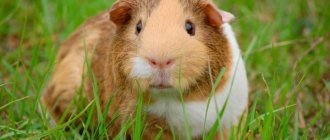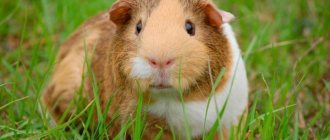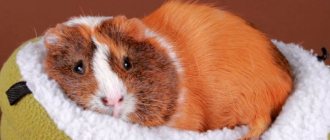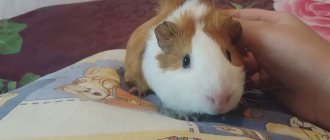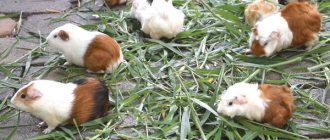- home
- Guinea pig
- General information about guinea pigs
02/06/2019 Guinea pigs are sensitive to changes in voice intonation.
They are able to recognize when the owner is angry or when he wants to play with him. Pets have excellent hearing and are able to express emotions and desires using a range of sounds. You don't need to be a wizard to understand what guinea pigs are talking about. It is enough to listen carefully to your pet.
Hums
Rumbling sounds can have a variety of meanings, depending on the position you are currently occupying. If the pig is currently feeling content and happy, then it will emit a guttural rumbling against the background of absolute relaxation and ease. However, if the rumbling sounds have a higher pitch, then the animal is most likely irritated by something. Tension in movements will also indicate this. If you take a closer look at the pet, you can see that it trembles while purring. But abrupt rumbling sounds clearly indicate that your pig is scared or feels uncomfortable.
Grinding/chattering of teeth
Why does a guinea pig chatter its teeth? Most often this is a bad sign. A pet can express its dissatisfaction and even anger in this way. If an animal makes hissing sounds by clicking its teeth or shows its teeth, then you can be sure that the animal is aggressive.
Grinding or chattering of teeth can be a warning sign of a fight. If pigs are kept together, they can arrange a division of territory or a showdown. It is better to accustom the animal to the neighborhood gradually. First, give the animals the opportunity to only hear each other. After a couple of weeks, the pigs can be placed in the same room. After some time, the rodents will be ready to live together.
When a pet has no conflicts with its relatives, and there are no obvious reasons for its anger, then it is worth checking the state of its health.
Rodents often chatter their teeth when they have an upset stomach.
Grinding can occur due to overgrowth of teeth, insufficient grinding of them on solid food and toys. A dental defect can cause infection or deterioration. Therefore, you should visit a veterinarian without delay.
Squeals or whines
A squeal is a high-pitched squeak that unmistakably signals that your pet is feeling unwell and is overcome by fear and pain. If you hear this sound, be sure to check on your pets to make sure they are okay and no one was hurt. By whining or moaning, guinea pigs want to tell their owners about their irritation or dislike for something or someone, for example, their brothers.
Chirps or tweets
The pig can not only squeak and purr, but also chirp and chirp like a bird. The feeling from such sounds is as if the pet is singing. Such sounds mean an extreme degree of excitement.
The pig sometimes chirps for up to half an hour, not noticing anyone around, immersed in an exciting state. This is how she experiences severe stress.
The expectant mother can thus announce to everyone around her that she will have cubs. The male can use his chirping to attract the female to mate. If two pigs are chirping among themselves, you don't have to worry. Nothing bad happens.
Language of the body
Guinea pigs can also communicate through body language. If you understand this language, you will receive the keys to understanding what is happening to your pet.
When juveniles are particularly happy, excited, or in a playful mood, they like to jump up and down. Although this behavior is also typical for older representatives of the species. However, they don't jump that high.
Numbness often occurs at a moment of great surprise or doubt about something. Then she will stand still.
Sniffing is a way for guinea pigs to assess what is happening around them. In addition, this is how they recognize each other by sniffing the area around the nose, chin, ears or backside. And if they want to greet their brother in a friendly way, then they touch each other’s noses.
Showing aggression, a guinea pig tries to rise above its opponent, raising its head and standing on stiff legs. In addition, they sway menacingly from side to side, their fur stands up, and their mouth distorts into a grin. To enhance the effect, rodents can also hiss and grind their teeth. If you notice this behavior in your pets, be on the lookout. You may have to intervene in their relationship to prevent a fight.
If an animal swaggers, sways from side to side on stiff legs, and even grinds its teeth, this may be a sign of aggression. Although during the mating season, pompous behavior towards an individual of the opposite sex is an element of courtship.
Guinea pigs love to mark their territory. To do this, they rub their chin, neck or backside against the objects they want to get.
The desire to rise up manifests itself either during sexual relations between males and females, or at the moment of the formation of a hierarchy within the social structure of guinea pigs when kept in groups.
If your guinea pig is handled, it may show signs of anxiety and agitation. This may indicate that she wants to go to the toilet or that she is simply tired of playing with you. Be that as it may, you should return your pet, at least for a while, back to the cage.
Throwing back the head can be observed in spoiled guinea pigs at the moment of irritation. This way they can ask their owner to stop.
If a rodent begins to lick its owner, many consider this a sign of love. Maybe that's true, or maybe they just like the taste of salt on your skin.
They also love to be picked up by their owner out of their cage. Although at first the pigs show timidity, this is not at all because they do not want to play with the owner, but because a natural defense mechanism is manifested in them. It won't be long before she wants to cuddle up to you.
Article on the topic: A complete guide to the care and maintenance of a guinea pig
Decoding the movements of a guinea pig
As was said, it is easiest to decipher the sound signals given by pets if we consider them in inextricable connection with the movements of the animals. Body language, therefore, is no less important in the communication process than vocal communication, because the same sound, depending on the circumstances, can have not just different, but even opposite meanings.
Here are just a few characteristic movements of guinea pigs with their most likely interpretation:
| Movement, behavior | Possible meaning |
| Bouncing | "I want to play" |
| Throwing back the head | "I'm stronger, I'm not afraid of anyone" |
| Dropping of the head (may be accompanied by a low purring sound) | “Let’s put up, I give up, you are stronger” |
| Standing on the hind legs with the front legs extended forward | “Admire how good I am (good)” |
| Stand on your hind legs with your head stretched up | “I really want to reach something that is extremely necessary” (usually water or treats, but possibly toys) |
| Wide open mouth showing front teeth | "Better leave before it's too late" |
| Freezing in place, complete lack of movement | “I’m not here, go where you were going” |
| Paws tucked, searching for support behind the back | “It’s scary that something might happen” |
| Head stretched forward | “I’m all (entirely) attentive” |
There is a unique term in describing the behavior of guinea pigs - popcorning. It means a complex of characteristic body movements: the animal jumps, sometimes even somersaults, shakes its head, twitches its paws, twists its butt. This behavior can seriously frighten a novice breeder, but in fact it just means a high degree of disposition, excellent mood and a desire to frolic.
If an animal is stretched out in a cage or on the floor and does not make any sounds, then there can be no doubt about deciphering this behavior: the animal is well, it is peaceful and does not mind taking a quiet nap.
Why does a pig whistle and squeak when you pet it?
The guinea pig is a rather talkative animal that makes different sounds.
The loudest is a high-pitched squeak or whistle, quite unexpected for such a small creature.
A pet may squeak in some cases:
- she is scared;
- hungry;
- she is bored.
As soon as the animal appears in the family, it experiences stress and tries to hide in a house or bury itself in the hay. When trying to pick him up, he will respond with a loud and indignant or frightened squeak. You should not forcibly grab and hold her in your arms if she screams and tries to hide. In a few days, the shock will pass, and she herself will go to meet the owner to get acquainted.
You need to talk to the animal more often, sitting next to the cage.
When the piglet gets used to it, it will respond to stroking and affectionate conversations with it with a contented, quiet squeak. Some produce real trills, similar to bird songs. Some owners compare the pig's trills to the operation of a miniature radio transmitter.
Guinea pigs have a language, they can express their emotions too
When an animal is hungry or bored, as soon as it hears its owner’s steps, it will whistle loudly and invitingly, demanding food or communication.
If a family has a couple of guinea pigs, you can hear the animals calling each other by whistling or even swearing, squealing shrilly at each other.
Please help me figure it out.
Please help me figure it out. ¶
From: Anet - January 4, 2008 10:43 pm
When I take my piglet in my arms and start stroking him, he not only makes cooing sounds, I hope that this is because he likes it, although I haven’t quite learned to understand what he says. But he also seems to tremble when I stroke him. This is fine? Or does he not like something?
Please help me figure it out. ¶
From: Hrum - January 4, 2008 11:19 pm
I think that he just doesn’t like it. You described a sound similar to the indignation of pigs. On the main page of the site there are sounds of guinea pigs and their “translation” into human ones.
Please help me figure it out. ¶
From: Anet - January 4, 2008 11:47 pm
It’s very strange, but what should we do? He seems to be lying down, and even yawns and closes his eyes.
Please help me figure it out. ¶
From: Hrum - January 4, 2008 11:56 pm
You don't have to do anything. It’s just that some pigs don’t like to be petted, girls don’t like to have their butts touched. They also murmur when they hear sounds that are strange to them. So you don’t need to do anything: it’s babbling and let it babble to itself, maybe it will get used to it and stop.
Please help me figure it out. ¶
From: Anet - January 4, 2008 11:59 pm
I listened to the sounds as you advised, Marina, but I didn’t find any unpleasant ones among them. Maybe it's not so bad after all? I have a boy, I still try not to touch his butt. But why is he trembling a little?
Please help me figure it out. ¶
Why is it bad right away? The pig simply communicates; the sounds are still very difficult to describe in words. Similar sounds express both joy and dissatisfaction, so it’s better to listen and compare, otherwise I’ll tell you here now. Here’s the link, listen to all the sounds again, maybe you’ll find a similar one Sounds
Please help me figure it out. ¶
From: KsyuKha - January 5, 2008 10:28
I call these sounds “purrs.” Very often, males (and females too) just like it when they are stroked along the back to the butt. Then they begin to “purr” (at the same time they vibrate their body) sometimes they step with their hind legs in delight. If he didn’t like it, he would make a chattering sound with his teeth or kick you with his “hoof”
Please help me figure it out. ¶
From: Bmwx5 - January 6, 2008 11:29 pm
I understand the author. I have the same picture, and at the same time it doesn’t quite look like happy sounds. He also covers his eyes and swears!
Please help me figure it out. ¶
From: Anet - January 7, 2008 9:43 pm
Here you go. hopeless situation. Sounds. those made by a pig when she doesn’t like something and the ones she makes when she is pleased are very similar. And which one is correct? I think the piglet is not a fool and would somehow express what is unpleasant to him in some other way, not just by rumbling, well, he would try to run away or, indeed, chatter his teeth or something else. But he’s sitting! And it rumbles! and has nowhere to run!
Please help me figure it out. ¶
From: Angelina - January 8, 2008 3:33 pm
My little one also purrs when they pet her, and then she starts making some interesting sounds, I can’t even compare them to anything, and she closes her eyes. I think she likes it because she finally has the highest degree of trust - she falls on her side, stretches out her hind legs and allows her to scratch her tummy.
Sniffles/wheezes/whistles
A satisfied pet often sniffles, and a well-fed pet whistles. While waiting for a treat, the animal may begin to sniffle and gradually switch to whistling. This situation can occur when opening the refrigerator.
If the owner does not get a treat, the pet can also whistle to attract attention to his person and get something tasty.
A prolonged whistle or a whistle repeated after a few seconds by animals can serve as a greeting or signal that they are hungry.
If your guinea pig wheezes when he breathes, he needs to be seen by a veterinarian.
